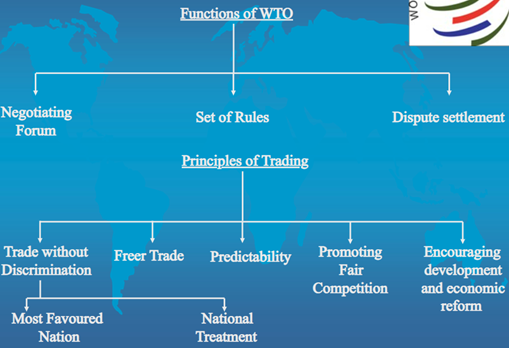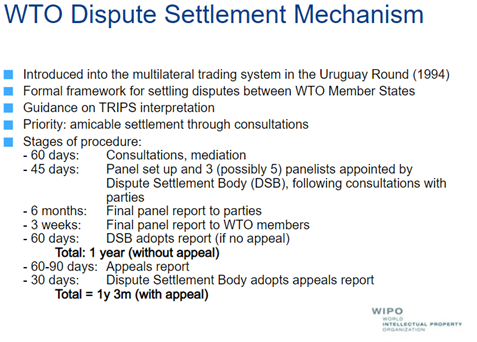Description

Disclaimer: Copyright infringement not intended.
Context
- China took legal action against the US in the WTO over chip export control measures.
Concerns and assertions of China
- In its latest move, the US government announced a broad set of technology export controls in early October, including a ban on shipments to China of certain semiconductor chips made anywhere in the world using US equipment.
The move has caused harm for the global supply chain, and the ban also backfired among American semiconductor producers.
- In recent years, the US has been generalizing the concept of national security and abusing export control measures, which hinders normal international trade in chips and other products, as well as threatening the stability of the global industrial chain and supply chain.
- The move is a typical trade protectionism practice as it disrupts the international economic and trade order, violates international economic and trade rules as well as basic economic laws, and harms the global interests of peaceful development.
- China urged the US to give up its zero-sum game mindset, correct its wrongdoings in a timely manner, and stop disrupting trade in high-tech products such as chips, so as to maintain normal economic and trade exchanges between China and the US, and maintain the stability of the global supply chain for important industrial goods such as semiconductors.
Report by Boston Consulting Group
- By 2025, US companies could lose 18 percentage points of global market share and 37 percent of their revenues if the US completely bans semiconductor companies from selling to Chinese customers, effectively causing a technology decoupling from China.
The free fall in revenue would inevitably lead US semiconductor companies to make severe cuts in research and development and capital expenditure, resulting in the loss of 15,000 to 40,000 highly skilled jobs in the US semiconductor industry.
About World Trade Organization
- It was established on January 1, 1995 through the Marrakesh Agreement, as the successor to the General Agreement on Tariffs and Trade (GATT).
- It covers trade in services and intellectual propertyand introduced procedures for dispute settlement.
- It is a Binding institutionand its working is Consensus-based.
- Presently 151 members that negotiate to reduce barriers in trade.
- This Geneva based organisation governs nearly $23 billion of global trade.
- This ‘member-driven’ organization is viewed as an
- International platform to negotiate multilateral and plurilateral agreements dealing with trade
- Dispute settlement system for disputes arising out of negotiated agreements.

Benefits of WTO membership
WTO membership provides:
- Most favoured nation treatment, which means equal access for all companies of all WTO members to the markets of all members of the organization;
- National treatmentthat prohibits national producers from gaining advantages over importers;
- Reduction of trade barriers, primarily tariffs and quantitative restrictions, which provides for increased trade between members;
- Predictability and transparency of international trade– WTO members have bound their tariffs and cannot, except for good reason, introduce other import restrictions, such as bans or quotas;
- Increased competitivenessby eliminating unfair practices between trading partners aimed at stimulating trade, primarily export subsidies and dumping;
- Opportunity to defend trade interestsat the WTO dispute settlement body, since all members will have international commitments towards Belarus for non-application of trade restrictions.
.jpg)
WTO Dispute settlement
- Resolving trade disputes is one of the core activities of the WTO. A dispute arises when a member government believes another member government is violating an agreement or a commitment that it has made in the WTO. The WTO has one of the most active international dispute settlement mechanisms in the world.
- If the parties to the dispute do not manage to reach a mutually agreed solution, the complainant is guaranteed a rules-based procedure in which the merits of its claims will be examined by an independent body (panels and the Appellate Body). If the complainant prevails, the desired outcome is to secure the withdrawal of the measure found to be inconsistent with the WTO Agreement.
- Thus, the dispute settlement system provides a mechanism through which WTO Members can ensure that their rights under the WTO Agreement can be enforced.

What is the WTO’s Appellate Body, and why is it important?
- The Appellate Body, set up in 1995, is a standing committee of seven members that presides over appeals against judgments passed in trade-related disputes brought by WTO members.
- Countries involved in a dispute over measures purported to break a WTO agreement or obligation can approach the Appellate Body if they feel the report of the panel set up to examine the issue needs to be reviewed on points of law. Existing evidence is not re-examined; legal interpretations are reviewed.
- The Appellate Body can uphold, modify, or reverse the legal findings of the panel that heard the dispute. Countries on either or both sides of the dispute can appeal.
- The WTO’s dispute settlement procedure is seen as being vital to ensuring smooth international trade flows. The Appellate Body has so far issued 152 reports. The reports, once adopted by the WTO’s disputes settlement body, are final and binding on the parties.
The problem in the WTO Appellate Body
- Over the last few years, the membership of the body has dwindled to just three persons instead of the required seven.
- This is because the United States, which believes the WTO is biased against it, has been blocking appointments of new members and reappointments of some members who have completed their four-year tenures.
- At least three people are required to preside over an appeal, and if new members are not appointed to replace the two retiring ones, the body will cease to be relevant. Between 1995 and 2014, around 68% of the 201 panel reports adopted were appealed.
- The understaffed appeals body has been unable to stick to its 2-3 month deadline for appeals filed in the last few years, and the backlog of cases has prevented it from initiating proceedings in appeals that have been filed.
.jpg)
Members’ call
- At a meeting of the Dispute Settlement Body (DSB) on 28 March 2022, a large group of members continued their push to start the process for filling vacancies on the WTO’s Appellate Body, arguing that continued delay was damaging to the interests of members and to the multilateral trading system as a whole.
https://www.globaltimes.cn/page/202212/1281734.shtml







.jpg)








